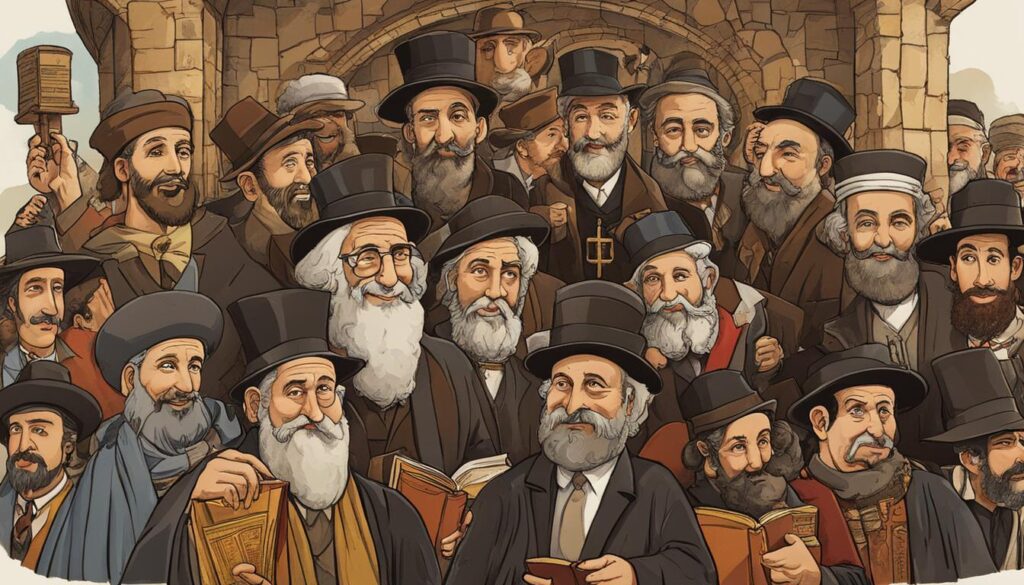If you’re interested in learning about the Jewish faith, look no further than “Judaism For Dummies” by Ted Falcon. This comprehensive guide provides readers with a concise summary of Jewish beliefs and practices, making it an invaluable resource for anyone seeking to gain a deeper understanding of Judaism.
In this article, we will explore the essentials of Judaism, from its history and foundations to its core beliefs and practices. Delve into the significance of the Torah and other Jewish scriptures, learn about the various aspects of Jewish worship and ritual, and gain insights into the major Jewish holidays and festivals. Additionally, we will examine the moral teachings and ethical values that guide Jewish individuals and communities, as well as the diverse range of Jewish religious expression represented by various sects and movements.
Key Takeaways
- “Judaism For Dummies” by Ted Falcon provides a comprehensive overview of the Jewish faith.
- The book covers the history and foundations of Judaism, its core beliefs and practices, and various aspects of Jewish worship and ritual.
- Readers will gain insights into the significance of the Torah and other Jewish holy texts, as well as the major Jewish holidays and festivals.
- The book also examines the ethical teachings and moral values that guide Jewish individuals and communities, as well as the diverse range of Jewish religious expression represented by various sects and movements.
- Overall, “Judaism For Dummies” is an invaluable resource for anyone seeking to gain a deeper understanding of Judaism.
Introduction to Judaism
Judaism is a monotheistic religion that originated in the Middle East more than three thousand years ago. It is one of the oldest Abrahamic religions, along with Christianity and Islam. Judaism is based on the belief in one God who revealed Himself to the Jewish people through prophets and sacred texts.
Central to Jewish beliefs is the idea of the covenant, an agreement between God and the Jewish people that established a special relationship between them. The covenant is symbolized by the Torah, the first five books of the Hebrew Bible, which contains the foundational beliefs and practices of Judaism. The interpretation and study of the Torah is important in Jewish theology and tradition.
Jewish practices and observances are based on a combination of divine commandments from God and interpretations by Jewish sages and rabbis throughout history. These practices include keeping kosher (following dietary laws), observing the Sabbath (a day of rest and worship from sunset on Friday until nightfall on Saturday), and observing holidays and festivals commemorating significant events and milestones in Jewish history.
| Jewish Beliefs | Jewish Practices |
|---|---|
| Belief in one God | Keeping kosher |
| The covenant between God and the Jewish people | Observing the Sabbath |
| The importance of Torah study and interpretation | Observing holidays and festivals |
These core beliefs and practices provide a framework for Jewish life and spirituality, guiding individuals in their relationships with God, other people, and the natural world. Throughout history, Judaism has adapted to changing times and circumstances, while remaining true to its core values and traditions.
The Torah and Jewish Scriptures
The Torah and Jewish holy texts play an essential role in Jewish religious life. The Torah, comprising the first five books of the Hebrew Bible, is the most sacred text in Judaism. It contains the foundation of Jewish beliefs and practices and is believed to have been given by God to Moses on Mount Sinai. The Torah is accompanied by commentaries, known as the Talmud and other Jewish scriptures, that offer in-depth interpretations and analysis of its teachings.
For Orthodox Jews, the Torah is considered the literal word of God. They observe strict adherence to its laws and commandments. For Reform Jews, the Torah is viewed as a human document that requires contemporary interpretation and is relevant to modern times. Conservative Jews take a middle ground, maintaining tradition while allowing for some flexibility in interpretation.
Jewish scholars study the Torah and other scriptures intensively to bring deep insights into their teachings. The texts provide guidelines for religious observance, ethical living, and spiritual development. Torah study is integral to Jewish religious education, and it is believed that it promotes personal growth and strengthens one’s connection to God.
Throughout history, the Torah and Jewish holy texts have played a significant role in shaping Jewish identity and culture. They continue to influence Jewish beliefs, practices, and religious observances, and remain fundamental to the Jewish faith today.
Jewish Worship and Rituals
Judaism places great emphasis on religious ceremonies, and Jewish worship and rituals form an integral part of Jewish religious life. Synagogue services are the primary form of Jewish communal worship, where congregants gather to pray and study Torah. Jewish services follow a set structure, with specific prayers, readings, and blessings performed at prescribed times.
Jewish people mark significant lifecycle events with religious ceremonies that reinforce the importance of community and family ties. Brit Milah is the circumcision ceremony that takes place on the eighth day of a Jewish boy’s life. Bat Mitzvah and Bar Mitzvah ceremonies celebrate a child’s passage into adulthood and community responsibility. Wedding ceremonies are joyous occasions that unite couples in matrimony under a chuppah.

Shabbat, the weekly day of rest, is another essential component of Jewish religious life. Every Friday evening, families gather to light candles, bless wine and challah, and enjoy a festive meal. The High Holy Days, Rosh Hashanah, and Yom Kippur, are the most sacred days of the Jewish calendar. These solemn days feature unique liturgy and prayers, including the blowing of the shofar and Yom Kippur’s Kol Nidrei service.
| Event | Jewish Rituals |
|---|---|
| Brit Milah | Circumcision ceremony on the eighth day of a Jewish boy’s life |
| Bat Mitzvah and Bar Mitzvah | Celebration of a child’s passage into adulthood with religious and community responsibilities |
| Wedding Ceremony | Uniting couples in matrimony under a chuppah |
In conclusion, Jewish worship and rituals provide a sense of community, history and reinforces the importance of Jewish traditions for the faithful. Synagogue services, Shabbat, and lifecycle events all create significant opportunities to come together in worship and solidarity.
Jewish Holidays and Festivals
Judaism celebrates numerous holidays and festivals throughout the year, each with its unique customs and traditions. These religious celebrations mark significant events in Jewish history and observance of key religious beliefs.
Rosh Hashanah
Rosh Hashanah is the Jewish New Year, usually celebrated in September. It is a time of introspection and reflection, and Jewish people worldwide gather in synagogues to recite special prayers and observe religious customs.
Yom Kippur
Yom Kippur is the holiest day in the Jewish calendar. It is a day of penance and atonement for sins committed in the past year. Jewish people fast and spend the day in prayer and contemplation of their personal and spiritual lives.
Sukkot
Sukkot is a week-long harvest festival that commemorates the 40 years that the Jewish people wandered in the desert after leaving Egypt. It is a joyous occasion, and Jewish people build and decorate temporary outdoor shelters called sukkahs.
Hanukkah
Hanukkah is an eight-day festival of lights and celebrates the miracle that occurred at the rededication of the Second Temple of Jerusalem. Jewish people light candles on a special menorah, exchange gifts and eat special foods like latkes and jelly donuts.
Purim
Purim is a joyous holiday that celebrates the salvation of the Jewish people from Haman’s plot in ancient Persia. Jewish people dress up in costumes, read the Book of Esther, and give gifts to family and friends.
Passover
Passover commemorates the exodus of the Jewish people from Egypt and their liberation from slavery. It is a week-long celebration where Jewish people avoid eating leavened bread and participate in a special seder meal.
Shavuot
Shavuot is the festival of weeks and celebrates the giving of the Torah at Mount Sinai. Jewish people observe the holiday by studying the Torah and going to synagogue, and young children often participate in ceremonies called confirmation or first fruits.
Jewish Ethics and Values
Ethics and values are key components of Judaism. The Jewish ethical system is rooted in the belief that every individual has a divine spark within them and the obligation to do what is right.
Throughout history, Jewish ethics have sought to guide the conduct of individuals, communities, and nations. Jewish values, including compassion, justice, and humility, provide the moral framework for making ethical decisions and living a meaningful life.
| Jewish Ethics | Jewish Values |
|---|---|
| Tikkun Olam (repairing the world) | Tzedakah (charity and generosity) |
| Pikuach Nefesh (saving a life) | Gemilut Hasadim (acts of loving-kindness) |
| Derech Eretz (common decency) | Torah study |
Jewish ethical and moral teachings provide a framework for making decisions in all areas of life, from personal relationships to business dealings. Ethics play an essential role in Jewish life and have inspired countless individuals to make a positive impact on the world.
Jewish History and Culture
For centuries, the Jewish people have maintained a rich cultural and historical heritage. From the days of Abraham and Moses to modern times, Jewish history is filled with numerous significant events that have shaped the faith and its followers. One such event is the Babylonian exile, which forced the Jews to adapt to new circumstances and reaffirm their religious beliefs. Later, the Roman occupation of Israel, the Diaspora, and the Holocaust brought the Jewish people closer together and instilled a determination to preserve their identity and customs.
In addition, Jewish culture has made numerous contributions to the world. Scholars like Maimonides and Spinoza have contributed to philosophy, while musicians like Leonard Bernstein and Bob Dylan have created unforgettable melodies. Jewish cuisine, art, and literature have also become part of the cultural heritage of many nations.

Jewish Diversity
Despite being a small nation, the Jewish people are diverse, with different communities spread across the globe. From the Ashkenazi Jews of Central and Eastern Europe to the Sephardic Jews of the Mediterranean and North Africa, there are many different cultural and religious traditions that have developed over the centuries.
Jewish Heritage Sites
Jewish heritage sites offer a glimpse into the rich history and culture of the Jewish people. The Wailing Wall, located in Jerusalem, is one of the most important sites for Jewish worship. It is the last remaining part of the Second Temple and has become a symbol of the Jewish people’s connection to their faith. Another notable site is the Synagogue of El Transito in Toledo, Spain, which is an example of the Sephardic architectural style and features intricate carvings and ornate decoration.
| Event | Description |
|---|---|
| The Babylonian Exile | Following the destruction of the First Temple, the Jewish people were exiled to Babylon where they had to adapt to new customs and reaffirm their faith |
| The Roman Occupation | Israel was occupied by the Roman Empire, resulting in the destruction of the Second Temple and the dispersal of the Jewish people |
| The Diaspora | Following the Roman occupation, Jewish communities were established throughout the world |
| The Holocaust | The systematic persecution and murder of six million Jews by Nazi Germany during World War II |
Jewish Sects and Movements
Judaism has a diverse array of sects and movements, each with its own unique beliefs, practices, and teachings. These groups have evolved over time, responding to changing social, cultural, and political contexts, leading to the formation of several religious denominations.
One of the most well-known Jewish sects is Orthodox Judaism, which emphasizes strict adherence to traditional Jewish law and custom. Reform Judaism, on the other hand, adapts and modernizes Jewish beliefs and practices to fit contemporary circumstances, often rejecting many of the traditional observances.
Conservative Judaism seeks to balance traditionalism with modernization, maintaining many traditional practices while adapting to new circumstances. Reconstructionist Judaism emphasizes the active role of the Jewish community in shaping Jewish traditions, as well as the importance of culture and identity in Jewish religious expression.
Other notable Jewish movements include Hasidic Judaism, Humanistic Judaism, and Renewal Judaism, each with its unique approach to Jewish beliefs, spirituality, and community.
Contemporary Issues in Judaism
Judaism, like all religions, is affected by the social, political, and economic trends of the times. This has led to an array of challenges that confront the Jewish faith in the modern world. The following are some of the contemporary issues and modern challenges that Judaism faces today:
- The challenge of assimilation
With intermarriage rates on the rise, many Jews are leaving their faith behind. The overwhelming majority of American Jews say being Jewish is “mostly” or “somewhat” important to them, however, less than half of Jews in interfaith relationships are raising their children exclusively Jewish. - The threat of anti-Semitism
Although many Jewish communities have achieved significant success and integration within their larger societies, anti-Semitism remains a persistent and pernicious problem in many parts of the world. Studies show that anti-Semitic incidents have been on the rise in recent years. - Interfaith relations
Given the diversity of the modern world, interfaith dialogue has become an important part of Jewish life. While dialogue can promote understanding and cooperation, disagreements over fundamental religious tenets can also create tension. - Israel and Palestine
The modern State of Israel is central to the Jewish faith, yet its history and policies are often controversial and viewed with suspicion by many outsiders. The ongoing conflict with Palestine continues to be a source of deep concern and division within the Jewish community.
Despite these challenges, faith in Judaism remains strong and vibrant. By engaging with contemporary issues and adapting to changing times, Judaism continues to evolve and thrive in the modern world.
Conclusion
After exploring the key elements of Judaism in “Judaism For Dummies” by Ted Falcon, it’s clear that this ancient faith is still relevant today. From its rich history and cultural heritage to its enduring moral teachings and religious practices, Judaism remains an integral part of many people’s lives.
One of the main takeaways from this book is the diversity within the Jewish community. With various sects, movements, and traditions, no two Jewish experiences are exactly alike. Yet, despite these differences, there is a strong sense of unity and shared identity among Jewish individuals and communities.
Another key takeaway is the importance of ethics and values in Judaism. From the commandments in the Torah to the ethical teachings of modern Jewish leaders, Judaism has always emphasized the value of leading a moral and ethical life.
Finally, this book sheds light on some of the contemporary issues and challenges that Judaism faces today. From assimilation to interfaith relations, the Jewish community is constantly adapting to the changing world around it while remaining true to its core beliefs and practices.
In conclusion, “Judaism For Dummies” is an excellent resource for anyone interested in learning more about this fascinating faith. Whether you’re a long-time member of the Jewish community or simply curious about Jewish beliefs and practices, this book offers valuable insights and understanding.



